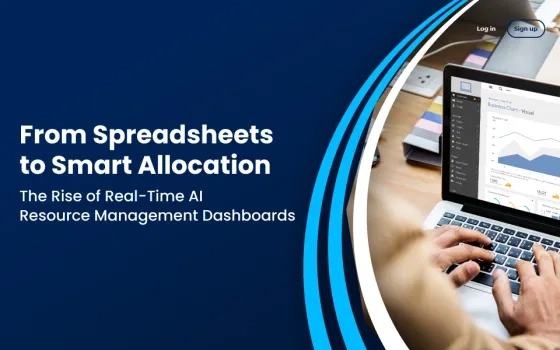A major shift in today's business landscape is the transformation of organizations from project-oriented data usage to a data-driven culture. Enterprises are leaning toward data and fostering a data-driven culture. Creating a data-driven culture enables them to gain buy-in, enabling them to make better, data-driven decisions.
Data-Driven Culture: Why is it Important?
A data-driven culture helps in making decisions backed by data and facts. By integrating advanced analytics frameworks and qualitative data, organizations can forecast profit and revenue. The concept of a data-driven culture positions data as the primary source for using insights across different departments of the company. With a data-driven strategy built upon these analytic skills, organizations can use data to make data-informed decisions.
The main goal is to enable employees to actively utilize data and improve their everyday work while effectively leveraging a company's potential to make more intelligent and efficient decisions. The volume of data across every industry is increasing rapidly. And with the complexity of data also growing, establishing a data-driven culture should not be considered aimlessly. It should enable organizations to promote the advancement of data manipulation skills along with critical thinking, thereby allowing them to make decisions based on trusted data insights.
Read more: Data as a Growth Enabler: Finding the Real Purpose of Data
By constructing a cultural framework, organizations can let every individual in the organization collaborate to transfer data at the center of decision-making. And the preconditions to build a data-driven culture include access to data, management of data storage, incorporation of methodological knowledge to examine data, and proper tools and technologies to examine data.
Challenges Companies Face in Adopting a Data-driven Culture
In many organizations, the search for comprehensive data literacy across the board encounters many challenges. Some of the key issues include a lack of budget, inadequate training and learning resources, lack of ownership of the training program, and employee resistance. By understanding and identifying the challenges that an organization faces, they can start addressing them head-on and work towards building a data-savvy workforce.
Data-driven decision-making implies making choices based on data. This strategy equips businesses to make better choices and take advantage of future opportunities. Data-driven decision-making ensures that businesses are aware of their status in the industry. By looking at the data, they can identify what's working for them and what isn't. And with firms becoming more data-focused, they are working towards driving a data-driven culture and establishing it as a key component for enhanced business intelligence and analytics.
Read more: Top Data Analytics Certification Programs to Explore in 2023
Cultivating a Data-Driven Culture
How are organizations adapting to this new era of data literacy?
The challenge many leaders face is cultivating a data-driven culture, as it is not always an easy undertaking. While many organizations have incorporated some form of data training, it is rarely an organization-wide initiative, and the idea often encounters resistance. Let's explore some tips for creating a data culture at the organization.
-
Identifying the responsibilities for data training
-
Pinpointing current challenges
-
Starting with a pilot project
Critical Components of a Data-driven Culture
While it is easy enough to integrate data into a decision-making process, it is difficult to make this a norm across organizational operations. What's more important is a change in mindset that shows a tough challenge. There are different components to take into consideration for an organization to data-driven culture. Let's explore them.
-
Data Maturity
Data maturity forms the basis of any data culture. It helps in processing the raw material and its management. An organization with strong data maturity is likely to have high-standard data quality. To attain a high level of data maturity, it is critical to have metadata management in place and to ensure that it is aligned with the KPIs. Organizations should record Data Lineage, which further helps in understanding what has occurred to it since its origin.
By establishing a strong data governance structure, employees will be able to have a proper level of access to the assembled data based on their decision-making demands. Other factors that are likely to impact data maturity include ease of access to the data sets, usability, and agile infrastructure.
Read more: How are Organizations Benefiting By Turning Data into Purpose?
-
Data Literacy
Data literacy portrays the ability to read, utilize, absorb, and interpret data to generate insights for consequential discussion and conclusion. For an organization, data literacy does not simply mean employees understand how to use and interpret data, but it mandates everyone to get a specific level of data literacy based on their job profile and the decisions they need to make.
-
Efficient Decision-making Process
Data has become an integral part of the decision-making process for organizations to gain the best value. However, they need to establish a planning mechanism that assists them in selecting between projects to work on and reviewing the decisions.
-
Data Consistency
In organizations, different teams have their own preferences for data metrics, sources, and programming languages, making it so difficult when combining them. Instead, organizations can integrate standardized coding and languages across their operations to avoid wasting time on retraining or translating data.
-
Data-driven Leadership for Growth
Leaders help in determining the culture of any organization. And to build a data-driven culture, they need to step up and lead by example. A data-driven leader will help raise the right questions and make their team responsible, thus ensuring that the right data is employed, structured, and processed. The leader should consider data a strategic asset for the organization and make the data a primary strategic priority.
Read more: The Ultimate Guide: How will Data Analytics Transform the Insurance Industry in 2023
Final Thoughts
A company's strategic decisions are majorly based on research, data analysis, and interpretation, along with market reports. By being a truly data-driven organization, they can gain an understanding of data and equip themselves with the necessary skills to work with it.
A data-driven culture is built upon analytic skills, where organizations can use data solutions to make data-informed decisions. Creating a data-driven culture to achieve buy-in across an organization is becoming essential in the modern world. When combined with work effort, it enables organizations to achieve larger objectives, thus benefiting the entire organization and enabling them to gain clarity on integrating a data-directed vision across operations.
Data-driven culture has become increasingly important in today's world. Organizations are effectively collecting, processing, analyzing, and communicating data for informed decision-making. A data-driven culture empowers employees at every level to understand and work with data and to enhance decision-making, thereby innovating and creating better customer experiences. However, the benefits of being a data-driven enterprise go beyond individuals, as data-driven organizations are likely to be recession-proof and outperform competitors that do not invest in data literacy skills to attract new customers.
Data-driven decision-making enables an organization to become more data-focused, fostering a data-driven culture - a key to achieving enhanced business analytics.
Today, businesses need to integrate data to make informed decisions if the goal is to stay ahead of the competition in this fast-changing, data-filled landscape. While creating and fostering a data-driven culture to extract value is an ongoing process that takes time and planning, starting small often helps. This allows business leaders to claim responsibility by identifying current challenges and aligning their learning goals with business vision. And the power of data can be unlocked through data collection and analysis, defining key indicators, designing a data-driven culture, and integrating tools and technology.
















